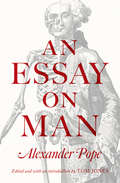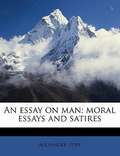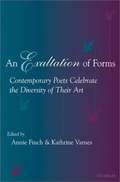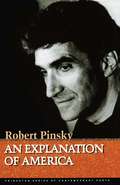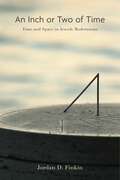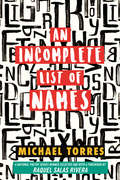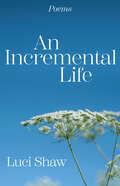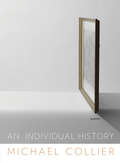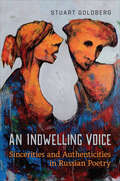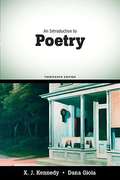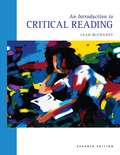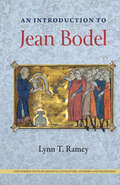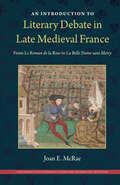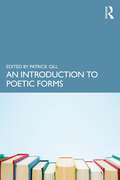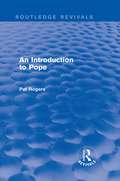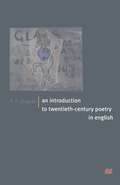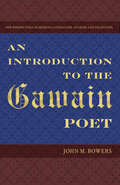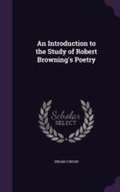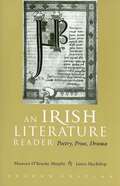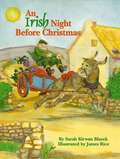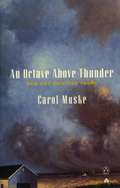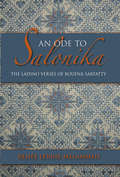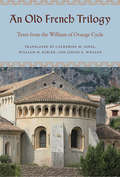- Table View
- List View
An Essay on Man
by Alexander Pope Tom JonesVoltaire called it "the most sublime didactic poem ever written in any language." Rousseau rhapsodized about its intellectual consolations. Kant recited long passages of it from memory during his lectures. And Adam Smith and David Hume drew inspiration from it in their writings. This was Alexander Pope's Essay on Man (1733-34), a masterpiece of philosophical poetry, one of the most important and controversial works of the Enlightenment, and one of the most widely read, imitated, and discussed poems of eighteenth-century Europe and America. This volume, which presents the first major new edition of the poem in more than fifty years, introduces this essential work to a new generation of readers, recapturing the excitement and illuminating the debates it provoked from the moment of its publication.Echoing Milton's purpose in Paradise Lost, Pope says his aim in An Essay on Man is to "vindicate the ways of God to man"--to explain the existence of evil and explore man's place in the universe. In a comprehensive introduction, Tom Jones describes the poem as an investigation of the fundamental question of how people should behave in a world they experience as chaotic, but which they suspect to be orderly from some higher point of view. The introduction provides a thorough discussion of the poem's attitudes, themes, composition, context, and reception, and reassesses the work's place in history. Extensive annotations to the text explain references and allusions.The result is the most accessible, informative, and reader-friendly edition of the poem in decades and an invaluable book for students and scholars of eighteenth-century literature and thought.
An Essay on Man; Moral Essays and Satires
by Alexander PopeAn Essay on Man is a poem published by Alexander Pope in 1733-1734. It is an effort to rationalize or rather "vindicate the ways of God to man" (l.16), a variation of John Milton's claim in the opening lines of Paradise Lost, that he will "justify the ways of God to men" (1.26). <P> <P> It is concerned with the natural order God has decreed for man. Because man cannot know God's purposes, he cannot complain about his position in the Great Chain of Being (ll.33-34) and must accept that "Whatever IS, is RIGHT" (l.292), a theme that was satirized by Voltaire in Candide (1759). More than any other work, it popularized optimistic philosophy throughout England and the rest of Europe.
An Exaltation of Forms: Contemporary Poets Celebrate the Diversity of Their Art
by Annie Finch Kathrine VarnesThe essays in the book represent a remarkably diverse range of literary styles and approaches, and show how the forms of contemporary English-language poetry derive from a wealth of different traditions.
An Explanation of America (Princeton Series of Contemporary Poets #156)
by Robert PinskyFrom An Explanation of America:LAIR Robert Pinsky ? Inexhaustible, delicate, as ifWithout source or medium, daylightUndoes the mind; the infinite, Empty actual is too bright,Scattering to where the roadWhispers, through a mile of woods … Later, how quiet the house is:Dusk-like and refined,The sweet Phoebe-note Piercing from the trees;The calm globe of the morning,Things to read or to write Ranged on a table; the brainA dark, stubborn current that breathesBlood, a deaf wadding, The hands feeding it paperAnd sensations of wood or metalOn its own terms. Trying to read I persist a while, finish the recognitionBy my breath of a dead giant's breath--Stayed by the space of a rhythm, Witnessing the blue gulf of the air.
An Illuminated Darkness
by Jaques Coetzee(There are shards of light also, but I will say nothing about them. A cellphone camera is recording what may be shared of this moment afterwards.) <P><P>Unwanted prayers on your behalf, kindnesses that you end up resenting - living with visual impairment is less about matters of sight than it is about problems of perception. <P><P>A life without mirrors is not a life without self-examination. On the contrary, Jacques Coetzee's debut is a manifesto of personhood, a portrait of a world brought into being by its textures, its movements, and - most importantly - its music. Easy-flowing and sensuous, this is a collection of the unexpected, the strange, and the suddenly beautiful. Unavoidably and undeniably, Coetzee's is a truly unique perspective. <P><P>Jacques Coetzee, born in 1972, matriculated from the Pioneer School for the Blind in Worcester. He has worked as a busker at the Cape Town Waterfront, and has tutored English literature to first- and second-year university students. In 2002 he obtained a Masters in Creative Writing from the University of Cape Town, and in 2018, he and Barbara Fairhead published a joint anthology of poems, The Love Sheet. He currently lives in Cape Town, where he is a singer-songwriter in the band Red Earth & Rust.
An Inch or Two of Time: Time and Space in Jewish Modernisms (Dimyonot)
by Jordan D. FinkinIn literary modernism, time and space are sometimes transformed from organizational categories into aesthetic objects, a transformation that can open dramatic metaphorical and creative possibilities. In An Inch or Two of Time, Jordan Finkin shows how Jewish modernists of the early twentieth century had a distinct perspective on this innovative metaphorical vocabulary. As members of a national-ethnic-religious community long denied the rights and privileges of self-determination, with a dramatically internalized sense of exile and landlessness, the Jewish writers at the core of this investigation reimagined their spatial and temporal orientation and embeddedness. They set as the fulcrum of their imagery the metaphorical power of time and space. Where non-Jewish writers might tend to view space as a given—an element of their own sense of belonging to a nation at home in a given territory—the Jewish writers discussed here spatialized time: they created an as-if space out of time, out of history. They understood their writing to function as a kind of organ of perception on its own. Jewish literature thus presents a particularly dynamic system for working out the implications of that understanding, and as such, this book argues, it is an indispensable part of the modern library.
An Inch or Two of Time: Time and Space in Jewish Modernisms (Dimyonot: Jews and the Cultural Imagination #3)
by Jordan D. FinkinIn literary modernism, time and space are sometimes transformed from organizational categories into aesthetic objects, a transformation that can open dramatic metaphorical and creative possibilities. In An Inch or Two of Time, Jordan Finkin shows how Jewish modernists of the early twentieth century had a distinct perspective on this innovative metaphorical vocabulary. As members of a national-ethnic-religious community long denied the rights and privileges of self-determination, with a dramatically internalized sense of exile and landlessness, the Jewish writers at the core of this investigation reimagined their spatial and temporal orientation and embeddedness. They set as the fulcrum of their imagery the metaphorical power of time and space. Where non-Jewish writers might tend to view space as a given—an element of their own sense of belonging to a nation at home in a given territory—the Jewish writers discussed here spatialized time: they created an as-if space out of time, out of history. They understood their writing to function as a kind of organ of perception on its own. Jewish literature thus presents a particularly dynamic system for working out the implications of that understanding, and as such, this book argues, it is an indispensable part of the modern library.
An Incomplete List of Names: Poems
by Michael TorresAn astonishing debut collection looking back on a community of Mexican American boys as they grapple with assimilation versus the impulse to create a world of their own.Who do we belong to? This is the question Michael Torres ponders as he explores the roles that names, hometown, language, and others' perceptions each play on our understanding of ourselves in An Incomplete List of Names. More than a boyhood ballad or a coming-of-age story, this collection illuminates the artist's struggle to make sense of the disparate identities others have forced upon him.His description of his childhood is both idyllic and nightmarish, sometimes veering between the two extremes, sometimes a surreal combination of both at once. He calls himself "the Pachuco's grandson" or REMEK or Michael, depending on the context, and others follow his lead. He worries about losing his identification card, lest someone mistake his brown skin for evidence of a crime he never committed. He wonders what his students--imprisoned men who remind him of his high school friends and his own brother--make of him. He wonders how often his neighbors think about where he came from, if they ever do imagine where he came from.When Torres returns to his hometown to find the layers of spray-painted evidence he and his boyhood friends left behind to prove their existence have been washed away by well-meaning municipal workers, he wonders how to collect a list of names that could match the eloquent truths those bubbled letters once secured.
An Incremental Life: Poems
by Luci Shaw"Luci Shaw is a legend" —Christianity TodayThis captivating collection of poems by beloved author Luci Shaw, reflects on daily ideas and activities as they arrive, bit by bit, to illuminate us with their wisdom and enlarge on the meanings of human experience. Like small messages from beyond, these incidents call us to pay attention. In An Incremental Life, Shaw breathes life into the simpleness of the every-day and finds God in the memory of the mundane. Through her verses, she explores the intricate tapestry of existence, from the tender memories of childhood to the profound questions of mortality. Her poems are like windows opening to the soul, inviting readers to pause, reflect, and savor the beauty of the world around them. INCREMENTS I live by increments, single breaths of an ambient air, marking off hours, days. Apprenticed to grace, I tread statio in sequentiae, edging every step forward before venturing the next. Staggering up towards the stony crests of the foothills, dusty, I am almost undone with weariness, only half believing that the view will widen. In my falling upward into your home, O Faithful One, stay with me, your wind music playing the ear of my mind like an instrument. "This is how life happens, one day at a time, in increments! And God is in each of them for us," Luci Shaw
An Individual History: Poems
by Michael Collier"Profound, emotional, sparing, loving, and sometimes very funny. . . . [Collier is] always the consummate craftsman."--Poet Lore An Individual History describes the fears, anger, and guilt--personal, familial, societal, political, and historical--that comprise a life. The figure of the speaker's maternal grandmother who was institutionalized for five decades serves as an overriding metaphor for this haunting, bold new work by an essential American poet. from "An Individual History" This was before the time of lithium and Zoloft before mood stabilizers and anxiolytics and almost all the psychotropic drugs, but not before thorazine, which the suicide O'Laughlin called "handcuffs for the mind." It was before, during, and after the time of atomic fallout, Auschwitz, the Nakba, DDT, and you could take water cures, find solace in quarantines, participate in shunnings, or stand at Lourdes among the canes and crutches.
An Indwelling Voice: Sincerities and Authenticities in Russian Poetry
by Stuart GoldbergHow have poets in recent centuries been able to inscribe recognizable and relatively sincere voices despite the wearing of poetic language and reader awareness of sincerity’s pitfalls? How are readers able to recognize sincerity at all given the mutability of sincere voices and the unavailability of inner worlds? What do disagreements about the sincerity of texts and authors tell us about competing conceptualizations of sincerity? And how has sincere expression in one particular, illustrative context – Russian poetry – both changed and remained constant? An Indwelling Voice grapples, uniquely, with such questions. In case studies ranging from the late neoclassical period to post-postmodernism, it explores how Russian poets have generated the pragmatic framings and poetic devices that allow them to inscribe sincere voices in their poetry. Engaging Anglo-American and European literature, as well as providing close readings of Russian poetry, An Indwelling Voice helps us understand how poets have at times generated a powerful sense of presence, intimating that they speak through the poem.
An Introduction To Poetry (Thirteenth Edition)
by X. J. Kennedy Dana GioiaKennedy/Gioia's An Introduction to Poetry, 13th edition continues to inspire students with a rich collection of poems and engaging insights on reading, analyzing, and writing about poetry. The authors of this bestselling book are the recipients of many prestigious poetry awards. Features new to this edition include: Exclusive conversation between Dana Gioia and U. S. Poet Laureate Kay Ryan, offer students an insider's look into the importance of literature and reading in the life of this poet. More than 50 new selections--from a wonderful range of poets including Kevin Young, Bettie Sellers, Mary Oliver, David Lehman, Constantine Cavafy, Rainer Maria Rilke, Anne Stevenson, James Weldon Johnson, Alice Fulton, Jimmy Baca, Rita Dove, Gwendolyn Brooks, and Lorine Niedecker, among others. New 2009 MLA guidelines--provides students the updated source citation guidelines from the new 7th edition of the MLA Handbook and incorporates these in all sample student papers.
An Introduction to Critical Reading
by Leah MccraneyThis unique college reading text gives students experience reading and evaluating poetry, short stories, essays, and textbook chapters. An innovative Instructor's Manual gives instructors a wealth of teaching ideas and background material on each piece with a focus on critical thinking.
An Introduction to Jean Bodel (New Perspectives on Medieval Literature: Authors and Traditions)
by Lynn T. RameyBringing the work of a highly influential medieval French writer to English-speaking audiences for the first time This book explores the life and works of Jean Bodel, an influential author who lived in twelfth-century Arras, France. A versatile poet, playwright, and epic writer who established new genres such as fabliaux and the mystery play, Bodel remains relatively unknown to Anglophone audiences. Lynn Ramey offers translations and summaries of works never published before in English while delving into Bodel’s historical and cultural context. After a brief introduction to the poet, Ramey highlights the stimulating and cosmopolitan environment of Arras, considering the influence of the Crusades and social movements in shaping Bodel’s works. Next, Ramey provides an extensive survey of all of Bodel’s known writing across his prolific career by genre, from his most well-known work, The Play of Saint Nicholas (Le Jeu de saint Nicolas), to his final piece, Farewell (Les Congés), which offers important insight into his diagnosis of leprosy toward the end of his life. Ramey translates several pieces including pastourelles, fabliaux, and selections from the Song of the Saxons (Chanson des Saisnes). The book also includes information on Bodel’s sources, a chronology, and a glossary. With much of the existing scholarship on Bodel only available in French, this book bridges a gap in knowledge of the poet and serves as a useful resource for both students and specialists. An Introduction to Jean Bodel allows a broader audience to engage with the writer’s wide-ranging work and contributions to literary history.A volume in the series New Perspectives on Medieval Literature: Authors and Traditions, edited by R. Barton Palmer and Tison Pugh
An Introduction to Literary Debate in Late Medieval France: From <i>Le Roman de la Rose</i> to <i>La Belle Dame sans Mercy</i> (New Perspectives on Medieval Literature: Authors and Traditions)
by Joan E. McRaeHow medieval poems sparked discussions on women’s agency, love, marriage, and honor that prefigured modern feminism This volume immerses readers in a debate tradition that flourished in France during the late Middle Ages, focusing on two works that were both popular and controversial in their time: Le Roman de la Rose by thirteenth-century poets Guillaume de Lorris and Jean de Meun and La Belle Dame sans Mercy by fifteenth-century royal secretary and poet Alain Chartier. This is the first comparative volume on these important works and the discussions they sparked. Engaging with questions of women’s agency, love, marriage, and honor, these two poems prompted responses that circulated via treatises, letters, and sermons among officials, clerics, and poets. Joan McRae provides commentary on the two texts, a timeline and summary of the resulting debates, and biographical sketches of the leading intellectuals who matched wits over different ways of reading the texts, including pioneering writer Christine de Pizan. McRae shows that these works and the debates, read together, consider a range of social issues that raise questions of gender, the place of power and hierarchy in societal relationships, and the responsibility of writers for the effect of their works on readers. An Introduction to Literary Debate in Late Medieval France is a helpful overview of these weighty arguments for both students and scholars. McRae provides a compact, comprehensive, and up-to-date study, spotlighting influential literary expressions that evolved into the “querelle des femmes,” the “woman question,” which in turn paved the way for modern feminism. A volume in the series New Perspectives on Medieval Literature: Authors and Traditions, edited by R. Barton Palmer and Tison Pugh
An Introduction to Poetic Forms
by Patrick GillAn Introduction to Poetic Forms offers specimen discussions of poems through the lens of form. While each of its chapters does provide a standard definition of the form in question in its opening paragraphs, their main objective is to provide readings of specific examples to illustrate how individual poets have deviated from or subverted those expectations usually associated with the form under discussion. While providing the most vital information on the most widely taught forms of poetry, then, this collection will very quickly demonstrate that counting syllables and naming rhyme schemes is not the be-all and end-all of poetic form. Instead, each chapter will contain cross-references to other literary forms and periods as well as make clear the importance of the respective form to the culture at large: be it the democratising communicative power of the ballad or the objectifying male gaze of the blazon and resistance to same in the contreblazon – the efficacy of form is explored in the fullness of its cultural dimensions. In using standard definitions only as a starting point and instead focusing on lively debates around the cultural impact of poetic form, the textbook helps students and instructors to see poetic forms not as a static and lifeless affair but as living, breathing testament to the ongoing evolution of cultural debates. In the final analysis, the book is interested in showing the complexities and contradictions inherent in the very nature of literary form itself: how each concrete example deviates from the standard template while at the same time employing it as a foil to generate meaning.
An Introduction to Pope (Routledge Revivals)
by Pat RogersIn this concise introduction to Pope’s life and work, first published in 1975, the poet’s highly successful career as a man of letters is seen against the background of the Augustan age as a whole. Pat Rogers begins by examining the relationship of the eighteenth-century writer to his audience, and discusses the role of style and versification in this. The book covers the whole of Pope’s work and includes not only the translations of Homer and such minor poems as The Temple of Fame, but also the prose, both drama and correspondence. Based on extensive research, this book will provide literature students with a greater appreciation and understanding of Pope’s verse and the ways in which he addressed his eighteenth-century context in his work.
An Introduction to Twentieth-Century Poetry in English
by R. P. DraperThis critical survey of modern poetry from Thomas Hardy to Seamus Heaney considers both the self-consciously revolutionary innovations of Modernism and more traditional developments, taking fully into account the extent to which 'English' can no longer be equated solely with England. Scots, Welsh and Irish poetry, and poetry from Commonwealth countries such as Australia, New Zealand and the Caribbean, are recognised as equally important aspects of the diversity that characterises modern poetry in English; and, in particular, the contributions of North American poets such as Ezra Pound, William Carlos Williams, Wallace Stevens and Robert Lowell receive the major emphasis that their achievement and extensive influence warrants and attention is given to important new perspectives in the work of women poets such as Adrienne Rich, Sylvia Plath and Elizabeth Bishop.
An Introduction to the Gawain Poet (New Perspectives on Medieval Literature: Authors and Traditions)
by John M BowersIn An Introduction to the Gawain Poet, John Bowers surveys an expanded selection of the works of Chaucer's anonymous contemporary, considering Sir Gawain and the Green Knight alongside the poet's lesser known but no less brilliant works.In addition to his succinct introductions and plot summaries, Bowers skillfully details the cultural, historical, political, and religious contexts for these works, synthesizing them with close reading of selected passages. Perhaps his most exciting contribution to the field is his choice to historicize the poet's life and works in the context of the royal culture of King Richard II, boldly contending that it was highly possible the Gawain Poet was a frequent visitor to Richard's court in London. The final chapter surveys the works influenced by, as well as the influences reflected in, the poet's work, from the Bible to The Lord of the Rings. The attention Bowers pays to the critical tradition that has developed around these texts over the past hundred years makes An Introduction to the Gawain Poet an ideal volume for both undergraduate students and scholars of the Gawain Poet. Bowers has marshaled his formidable skills to create a book impressive in its balanced combination of breadth and depth.
An Irish Literature Reader: Poetry, Prose, Drama, Second Edition
by James MacKillop Maureen O'Rourke MurphyIn a volume that has become a standard text in Irish studies and serves as a course-friendly alternative to the Field Day anthology, editors Maureen O’Rourke Murphy and James MacKillop survey thirteen centuries of Irish literature, including Old Irish epic and lyric poetry, Irish folksongs, and drama. For each author the editors provide a biographical sketch, a brief discussion of how his or her selections relate to a larger body of work, and a selected bibliography. In addition, this new volume includes a larger sampling of women writers.
An Irish Night Before Christmas
by Sarah Kirwan Blazek'Round Christmastime, things are a little different on the Emerald Isle. Instead of logs thrown onto the fire, we find turf blazing bright. Instead of cold eggnog spiced just right, the mother and father are enjoying their stout. You'll find no Donner or Cupid or Blitzen, but Ould Neddy the donkey and his small cart. Father Christmas with his Irish eyes twinkling ushers in his seven elves, and thus begins the wondrous Irish Night Before Christmas. This humorous tale, in the same vein as the famous Cajun Night Before Christmas, is the Irish version of Father Christmas's yearly visit. Told in delightful brogue, it will have everyone wishing "Nollaig sona agut!" (Merry Christmas to you!)
An Octave above Thunder
by Carol MuskeAn Octave Above Thunder presents a collection of poems spanning more than twenty years in the career of Carol Muske, who has won acclaim for work which marries sophisticated intelligence, emotional resonance, and technical craft. What most distinguishes Carol Muske's poetry is her awareness of the complicated web into which the personal and the political, the familial and the feminist, are woven. Filled with audible contemplation-invocation, echo, dreamsong, dirge-Muske's lyrical precision, assured touch, and exacting clarity make her one of the most talented poets of her generation. .
An Ode to Salonika: The Ladino Verses of Bouena Sarfatty
by Renée Levine MelammedThrough the poetry of Bouena Sarfatty (1916-1997), An Ode to Salonika sketches the life and demise of the Sephardi Jewish community that once flourished in this Greek crossroads city. A resident of Salonika who survived the Holocaust as a partisan and later settled in Canada, Sarfatty preserved the traditions and memories of this diverse and thriving Sephardi community in some 500 Ladino poems known as coplas. The coplas also describe the traumas the community faced under German occupation before the Nazis deported its Jewish residents to Auschwitz. The coplas in Ladino and in Renée Levine Melammed's English translation are framed by chapters that trace the history of the Sephardi community in Salonika and provide context for the poems. This unique and moving source provides a rare entrée into a once vibrant world now lost.
An Old French Trilogy: Texts from the William of Orange Cycle
by William W. Kibler Catherine M. Jones Logan E. WhalenWhile most English-language readers are familiar with Old French epic poetry, or chansons de geste, through the Song of Roland and its tale of gallant martyrdom, this volume provides a broader and richer view of the tradition by introducing songs devoted to the exploits of a different sort of hero—the brave and blustery William of Orange. An Old French Trilogy provides an updated English translation of three central poems from the twelfth-century Guillaume d’Orange cycle. In The Coronation of Louis, the hero saves both king and pope from would-be usurpers and earns the nickname “Short-Nosed William” after a fierce, disfiguring battle with a Saracen giant. In A Convoy to Nîmes and The Conquest of Orange, William conquers two important cities and wins the love of the Saracen Queen Orable. Tremendously popular in the Middle Ages, these works stand the test of time, and the accessible translations capture the sense of the original Old French decasyllabic verse without attempting to preserve or imitate its formal properties. The introduction to the volume discusses literary devices and motifs; historical context; issues of religious conflict, otherness, and gender roles; and themes such as loyalty and courage.
